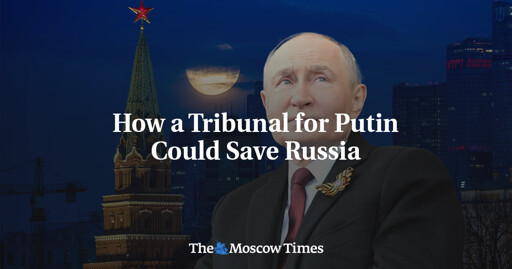Op-ed by Elena Davlikanova, Democracy Fellow with the Center for European Policy Analysis.
…
On May 9, European foreign ministers convened … to approve the establishment of a Special Tribunal for the crime of aggression against Ukraine … Following a formal request from [Ukrainian] President Volodymyr Zelensky, the Council of Europe’s Secretary General Alain Berset was tasked with leading the process.
…
The tribunal will not replace the International Criminal Court, which already issued an arrest warrant for Putin for the deportation of Ukrainian children. Instead, it aims to fill a gap that the ICC cannot fill because its current legal infrastructure is insufficient for prosecuting sitting heads of state for violating the UN Charter with the crime of aggression.
…
While much of the discussion around the tribunal has focused on accountability, deterrence and an attempt to restore respect for international law, its implications for Russia may prove to be just as important.
Prosecuting the Russian leadership is not simply about punishment. It may offer the country a chance to break from a cycle of impunity that has shaped its modern history. Without addressing the political culture that enables wars of conquest, repression and myth-making, Russia is likely to reproduce the same patterns, with new victims at home and abroad.
The human rights organization Memorial — now banned in Russia but still active abroad — has already acknowledged one of its own historical blind spots: not calling for perpetrators of Soviet-era atrocities to be held accountable after 1991 for their crimes. That omission, Memorial argued, helped allow for the return of authoritarianism and state violence in the post-Soviet era.
…
A tribunal would not only document crimes but also shape public discourse inside Russia and beyond. The Nuremberg Trials did not eliminate fascism in Germany. But they helped discredit it. A tribunal for the crime of aggression could initiate similar debates in Russia around the costs of empire, the role of political leaders and the meaning of national responsibility.
…
For Russia’s future, examining its past matters. A society that never discusses how wars begin or are allowed to continue is a society doomed to repeat a cycle of violence. Bringing senior officials to justice for launching the war in Ukraine may serve not just as a warning to future aggressors, but as a protective mechanism for Russia itself. It would help dismantle the idea that greatness is measured in destruction, oppression, and reassert the principle that power must answer to law.
…
The tribunal may not only contribute to saving Ukraine. It may help save Russia, too.
Obv that getting rid of putin & co would be beneficial to ordinary Russians.



